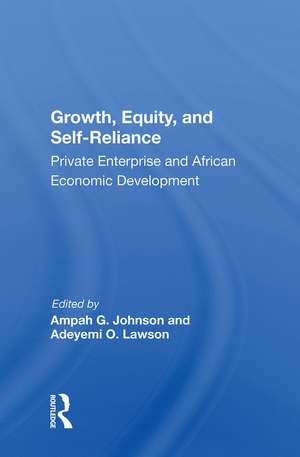Growth, Equity, And Self-reliance: Private Enterprise And African Economic Development
Editat de Ampah G. Johnsonen Limba Engleză Hardback – 7 iun 2019
Preț: 764.20 lei
Preț vechi: 1027.40 lei
-26% Nou
Puncte Express: 1146
Preț estimativ în valută:
146.36€ • 150.79$ • 122.60£
146.36€ • 150.79$ • 122.60£
Carte tipărită la comandă
Livrare economică 24 februarie-10 martie
Preluare comenzi: 021 569.72.76
Specificații
ISBN-13: 9780367006839
ISBN-10: 0367006839
Pagini: 174
Dimensiuni: 152 x 229 x 16 mm
Greutate: 0.45 kg
Ediția:1
Editura: Taylor & Francis
Colecția Routledge
Locul publicării:Oxford, United Kingdom
ISBN-10: 0367006839
Pagini: 174
Dimensiuni: 152 x 229 x 16 mm
Greutate: 0.45 kg
Ediția:1
Editura: Taylor & Francis
Colecția Routledge
Locul publicării:Oxford, United Kingdom
Descriere
This book explores what is, for many African countries, a new and controversial policy of relying on private actors rather than on government organizations to foster economic growth and development. The contributors explore key issues such as the impact of private enterprise on the development process, small- and medium-sized businesses as a vehicle for growth, and strategies for the expansion of markets and trade. The contributors analyze the historical, social, cultural, and economic obstacles to the development of private enterprise in Africa; the roles of government, women, and business organizations; access to capital and the function of financial institutions; private initiative and agriculture; the use of skilled and semi-skilled labor; and technology transfer. Arguing that private sector forces are crucial to African socioeconomic development, the contributors recommend economic policy reform, establishment of more private enterprises, and encouragement of new domestic and foreign investment.
